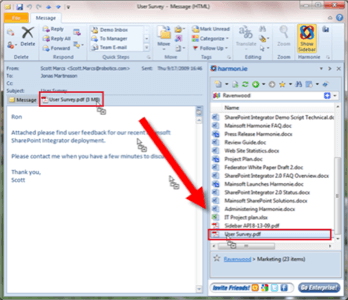According to a survey by uSamp, 80% of users with SharePoint access still chose to e-mail documents to necessary parties instead of using SharePoint. The company Mainsoft is hoping to change this by bringing SharePoint and Google Docs into Microsoft Outlook and Lotus Notes with its plugin harmon.ie.

harmon.ie adds SharePoint or Google docs as a sidebar in Outlook or Notes. Users can then drag and drop files from either document repository into their e-mail messages as easily as adding an attachment. Users on the receiving end can open the files just as if they were opening an attachment.

According to the uStamp survey, users don’t like to use SharePoint because:
- They don’t know how to use it.
- It takes too long/is too cumbersome to use.
- It’s difficult to find documents once they’re uploaded.
We all know the problem with attachments: revisions get lost, storage space balloons and and no one knows where the newest version of a document is.
Many social enterprise vendors talk about killing e-mail, but Mainsoft cites Forrester research revealing that e-mail and calendaring are the only collaboration tools have been widely adopted in enterprises. Trying to augment, let alone supplant, e-mail is a lofty goal.
Instead of trying to encourage adoption of new tools and processes, Mainsoft’s solution lets users do things the way they’ve always done them. And it seems to be working. One of Mainsoft’s clients, the infamous multilevel marketing company Amway, claims to have seen an e-mail attachment reduction of 42% since deploying harmon.ie.
This reminds me of one of my favorite takes on enterprise wikis: SamePage, which lets users use e-mail to update wiki pages.
Tools like harmonie and SamePage, and ones like SimplyBox and SocialCast, that bring new capabilities to existing applications and contexts give me more hope for a truly social enterprise than most tools that try to reinvent work for everyone – even when it seems so much like work needs to be reinvented. I’d rather see an imperfect social enterprise that exists than a perfect one that doesn’t.

















